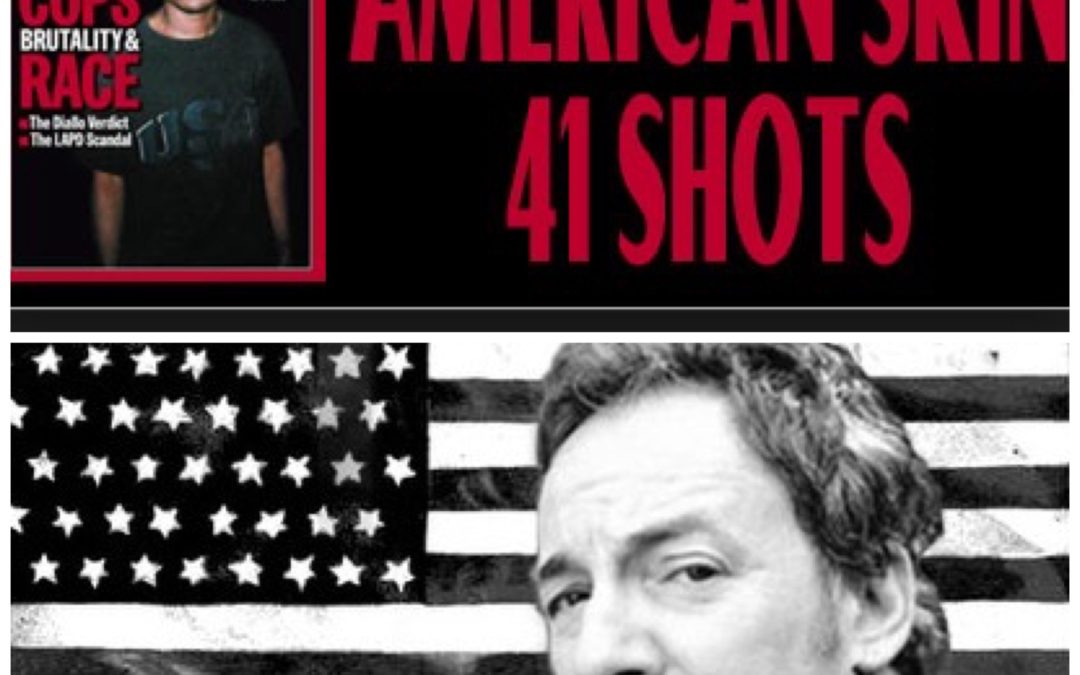“American Skin (41 Shots)” is a song written by Bruce Springsteen, inspired by the police shooting death of Amadou Diallo. It premiered during the band’s 1999–2000 reunion tour in concert in Atlanta on June 4, 2000, the final concert before the tour’s final ten-show run at New York City’s Madison Square Garden, where it was featured again. The performance led to some controversy in New York City, where the Patrolmen’s Benevolent Association called for a boycott of Springsteen’s shows.
The song was first released as a live version on the Live in New York City album. The same version appeared a few years later on The Essential Bruce Springsteen. In April 2001, a studio version of the song was released as a very rare U.S.-only one-track radio promotional single on CD-R. A music video featuring the performance from the New York City show was released in 2001 and directed by Jonathan Demme.
It was played at several concerts in April 2012 on the Wrecking Ball Tour in response to the shooting of Trayvon Martin. Springsteen performed the song on July 16, 2013, a few days following George Zimmerman’s controversial not guilty verdict. It was again dedicated to Martin at the Limerick, Ireland, concert with Springsteen saying before the song “I want to send this one out as a letter back home. For justice for Trayvon Martin”.
Springsteen was recognized by the NAACP with the Humanitarian Award on December 3, 2000.
[wiki] https://en.wikipedia.org/wiki/American_Skin_(41_Shots)
Bruce Springsteen’s 10-night stand at Madison Square Garden was supposed to be a victory lap to close out his 1999-2000 reunion tour with the E Street Band. But on June 8, 2000, four days before the first show, the president of the New York City Police Department Patrolmen’s Benevolent Association called for a boycott of Springsteen’s shows because of a new song, “American Skin (41 Shots).”
The song, which had its world premiere in Atlanta on June 4, was written in response to the February 1999 killing of Amadou Diallo by four New York police officers. Diallo, an immigrant from Guinea, was stopped at the front door of his Bronx apartment building because, the officers said, he resembled a serial rapist. He reached into his jacket pocket to grab his wallet, but the officers thought it was a gun and fired 41 bullets at Diallo, 19 of which struck him. A year later, all four men were acquitted on charges of second-degree murder and reckless endangerment.
As word of the new song spread, PBA President Patrick J. Lynch wrote a letter to the association’s members. “The title seems to suggests that the shooting of Amadou Diallo was a case of racial profiling — which keeps repeating the phrase, ‘Forty-one shots,’ it read. “I consider it an outrage that he would be trying to fatten his wallet by reopening the wounds of this tragic case at a time when police officers and community members are in a healing period.”
But had the police listened to “American Skin (41 Shots)” before making their judgment, they might have realized that Springsteen showed a degree of empathy with the policemen. In the chorus — “Is it a gun? / Is it a knife? / Is it a wallet? / This is your life” — Springsteen acknowledges the difficulty officers face in having to make split-second decisions.
Springsteen played “American Skin (41 Shots)” at all 10 of the Madison Square Garden concerts with a noticeable portion of the crowd booing. The song has remained an occasional presence at his concerts, notably on March 23, 2012, in Tampa, only a month after the shooting of Trayvon Martin by George Zimmerman in nearby Sanford, Fla. Following Zimmerman’s acquittal in July 2013, Springsteen dedicated the song to Martin at a show in Limerick, Ireland.


Recent Comments